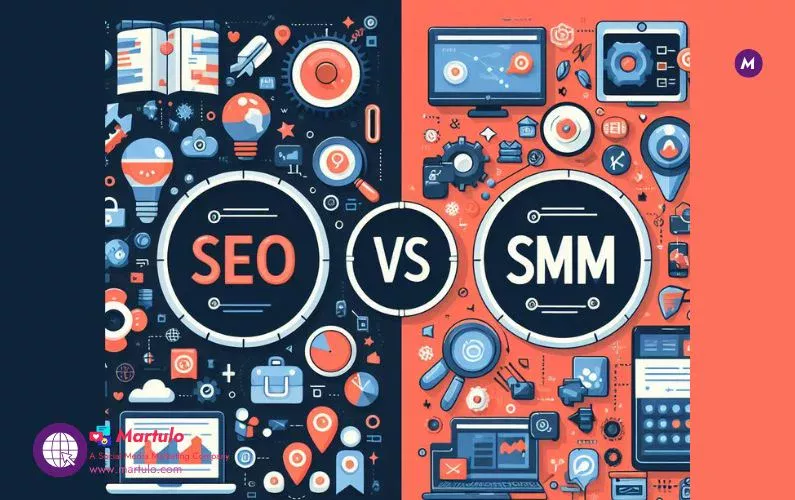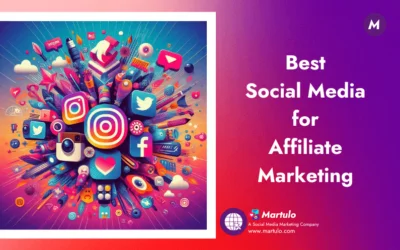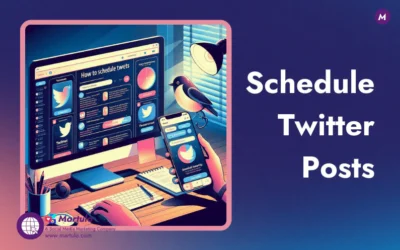
SEO vs SMM: Which is Best for Growing Your Business?
Written & Checked by - Nirav
Two distinct strategies to raise your online presence are SEO (Search Engine Optimization) and SMM (Social Media Marketing). SEO and SMM are the tools you can use to succeed whether you are a business owner wishing to market your brand, goods, or services or if you are a blogger, influencer, or individual professional hoping to increase website traffic or social media popularity.
However, a lot of people aren’t sure what the difference is between SEO and SMM, which is why we wrote this article. It is all about SEO vs. SMM in this article. We will talk about what SEO and SMM are, how they work, how they are different, and when and how to use them to get great results online.
What is SEO?
SEO (Search Engine Optimization) is the practice of improving your website so that it ranks higher on search engines like Google. The goal is to get more organic (unpaid) traffic to your site.
- SEO Keywords: These are specific words and phrases that people type into search engines when they’re looking for information. By using the right keywords on your website, you help search engines understand what your content is about.
- Long-tail SEO Keywords: These are longer and more specific phrases that visitors are more likely to use when they’re closer to making a purchase or when they’re using voice search. For example, instead of “shoes,” a long-tail keyword might be “best running shoes for flat feet.”
- On-page SEO Techniques: These involve optimizing individual pages on your website to rank higher. This includes using keywords in your content, optimizing meta tags (title tags, meta descriptions), using header tags correctly, and ensuring your site is mobile-friendly.
- Off-page SEO: This focuses on actions outside your own website to improve its ranking. The most important aspect is backlinks from other reputable websites to your own. This tells search engines that your site is trustworthy and valuable.
- Technical SEO Audit: This involves checking the technical aspects of your site to ensure it meets search engine standards. It includes checking site speed, mobile-friendliness, security (like HTTPS), and making sure search engines can crawl and index your site easily.
- Local SEO for Business: This helps your business show up in local search results. If you own a coffee shop, for instance, you want to appear when someone nearby searches for “coffee shop near me.” This involves optimizing your Google My Business profile, collecting positive customer reviews, and using local keywords.
In short, SEO involves various strategies and techniques to make your website more attractive to search engines, which in turn helps more people find your content and business online.
What is SMM?
SMM (Social Media Marketing) is the use of social media platforms to promote your products, services, or content. The goal is to engage with your audience, build your brand, and drive traffic to your website or business.
Here’s how SMM works:
- Social Media Platforms : There are many social media platforms such as Facebook, Instagram, Twitter, LinkedIn, TikTok, and so on that allow users to connect and share their content to these platforms.
- Producing and Sharing Content: You create posts, videos, photos, and other content types that interest viewers. To encourage others to like, share, and comment on the content, it should be engaging, informative, or entertaining.
- Interacting with Followers: You can communicate with those who follow you by answering their questions, messages, and comments. By doing this, you create a community and strengthen brand loyalty.
- Paid Advertising: If you want more people to see your content, you can also pay to do so. Thanks to social media platforms’ customized advertising, you may contact particular groups depending to their geography, interests, and other characteristics.
- Analytics & Metrics: You may monitor likes, shares, comments, and other data to see how well your content is performing. This helps in getting an idea of what works well and what does not so that you can improve your strategy.
In short, social media marketing (SMM) is all about connecting with your audience, promoting your brand, and driving traffic to your business. It includes making interesting content, interacting with followers, running paid ads, and looking at the results to figure out how to improve your strategy.
SEO vs SMM: Similarities and Differences
While SEO and SMM are distinct approaches, they share some fundamental similarities:
Similarities
-
Traffic Generation: Both SEO and SMM aim to drive traffic to your website. SEO does this through organic search results, while SMM brings traffic through social media clicks.
-
Brand Awareness: Whether it’s ranking high on Google or going viral on TikTok, both strategies help more people become aware of your brand.
-
Ongoing Effort: Neither SEO nor SMM is a “set it and forget it” strategy. Both require consistent effort and optimization to achieve and maintain results.
Differences
-
Focus: SEO focuses on optimizing your website for search engines, while SMM is about engaging with your audience on social media platforms.
-
Content Types: SEO content is typically informative and educational, using keywords strategically to rank higher in search results. SMM content is more diverse, including images, videos, stories, and interactive posts designed to spark conversation and engagement.
-
Audience: SEO targets people actively searching for information related to your products or services. SMM reaches a broader audience, including those who may not be actively looking for your offerings but could become interested through engaging social media content.
-
Results Timeline: SEO is a long-term game. It takes time for search engines to crawl and index your website, and even longer to see significant improvements in rankings. SMM can deliver faster results, especially with paid advertising campaigns or viral content, but those results may not be as sustainable without continued effort.
-
Cost: While SEO can be done with minimal financial investment (mainly focusing on time and effort), SMM can become costly, especially with paid advertising campaigns and influencer marketing.
-
Measurement: SEO success is measured primarily through website traffic, keyword rankings, and conversions. SMM success is measured by engagement metrics (likes, shares, comments), reach, impressions, and social media conversions.
When to Use SEO:
SEO drives long-term, sustainable growth.It’s your secret weapon for attracting potential consumers who are actively looking for what you’re offering.
SEO is the ideal option if:
You are playing the long game: SEO is similar to planting a tree.Long-term effects require patience and nurture to take hold.SEO provides long-term organic traffic growth.
You’re Targeting Specific Keywords: SEO is all about keywords, which are the words and phrases that people enter into search engines.SEO can help your website appear when your target audience searches for it.
SEO generates high-intent traffic, which is more likely to convert into buyers seeking your solutions.They are not simply browsing; they have a specific demand or question.
When Is the Best Time to Use SEO?
If you’re launching a new website, SEO can help it get noticed and indexed by search engines, paving the way for future growth.
If you have a brick-and-mortar business or serve a specific geographic area, using local SEO methods can help you rank higher in local searches and attract nearby clients.
Creating informative content, such as blogs, articles, or guides, can boost SEO.Creating high-quality content that answers user questions can lead to greater search engine rankings.
You prioritize long-term results: While SEO may not provide immediate success, its benefits accumulate over time.Investing in a strong SEO plan can help your website rank higher and generate more qualified traffic over time.
Examples of Businesses that can Benefit from SEO:
E-commerce Stores: Optimize product pages and write useful blog posts to rank for relevant search terms and attract customers.
Local Businesses: Local SEO can help businesses appear in Google Maps and “near me” searches, directing customers to their real location.
Service Providers: For service providers, use insightful blog posts and articles to showcase their expertise and target relevant keywords.
B2B Company: B2B companies should optimize their website for industry-specific keywords to attract potential clients looking for business solutions.
When to Use SMM?
Social Media Marketing is your ticket to instant connection and engagement with your audience. It’s where you can showcase your brand’s personality, spark conversations, and build a loyal community around your products or services.
SMM is the best choice if:
-
You Want to Build Brand Awareness: Social media is a powerful tool for getting your brand in front of a massive audience. Through eye-catching visuals, compelling stories, and shareable content, you can make a lasting impression and stay top-of-mind with potential customers.
-
You’re Looking for Direct Engagement: Unlike SEO, SMM allows you to directly interact with your audience. You can answer questions, respond to comments, and even run polls or contests. This builds relationships and fosters a sense of community around your brand.
-
You Want Fast Results: While SEO takes time, SMM can deliver quicker results, especially if you invest in paid advertising or create viral content. You can see an immediate increase in website traffic, leads, or even sales.
When is the Best Time to Use SMM?
-
You’re Launching a New Product or Service: SMM is a great way to generate buzz and excitement around a new offering. You can create teaser campaigns, run contests, and partner with influencers to reach a wider audience.
-
You Want to Showcase Your Brand’s Personality: Social media is a visual platform where you can let your brand’s unique voice and style shine through. Use humor, storytelling, and behind-the-scenes glimpses to connect with your audience on a personal level.
-
You Want to Drive Traffic to Specific Pages: Whether it’s a blog post, a landing page, or a special offer, SMM is a great way to direct traffic to specific parts of your website.
-
You Want to Build a Community: Social media allows you to create a space where your customers can interact with each other and your brand. This fosters loyalty and turns customers into advocates.
Examples of Businesses That can Do Well with SMM:
-
Restaurants and Cafes: Share mouthwatering food photos, promote daily specials, and run contests to attract local diners.
-
Fashion and Beauty Brands: Use visually appealing images and videos to showcase your products, collaborate with influencers, and run social media fashion shows.
-
B2C Companies: Share customer testimonials, run giveaways, and create interactive content to engage with your audience and drive sales.
-
Nonprofits and Charities: Raise awareness for your cause, share impact stories, and run fundraising campaigns on social media.
Compariosn Table: SEO Vs. SMM
| Feature | SEO | SMM |
| Primary Focus | Optimizing for search engines (Google, Bing, etc.) |
Engaging with the audience on social media platforms (Facebook, Instagram, etc.)
|
| Content Type | Informative, educational, keyword-rich |
Engaging, visual, interactive, story-driven
|
| Target Audience | People actively searching for information, solutions, or products |
Broader audience, including those not actively searching but open to discovering brands
|
| Results Timeline | Long-term, gradual improvements in rankings and organic traffic |
Faster results possible, but require ongoing effort
|
| Cost | Generally lower, can be done with minimal financial investment |
Can be more expensive, especially with paid advertising and influencer marketing
|
| Success Metrics | Website traffic, keyword rankings, organic search visibility, conversions |
Social media Engagement (likes, shares, comments), reach, impressions, social media conversions
|
| Ideal For | Long-term growth, targeted keyword strategies, attracting high-intent traffic, local SEO |
Brand awareness, community building, direct engagement, quick results, specific campaigns
|
| Examples | E-commerce stores, local businesses, service providers, B2B companies |
Restaurants, fashion brands, B2C companies, nonprofits
|
Conclusion

While both SEO and SMM are powerful tools in the digital marketing toolbox, the best strategy for your business depends on your specific goals, target audience, and budget.
If you’re looking for long-term, sustainable growth and want to attract people actively searching for your products or services, SEO is your best thing. If you want to build brand awareness, engage with your audience, and drive quick results, SMM is the thing you should go with.
Of course, the most effective approach often involves a combination of both strategies. By using SEO to bring people to your website and SMM to build relationships with your customers, you can create a powerful marketing tool that drives sustainable growth for your business.
Latest Post
How To Make Money On Instagram?
Have you ever wondered whether you could make money on Instagram? If you believe you need thousands of followers to begin earning, think again! With the appropriate tactics, even a modest following can help you monetise your Instagram account. In this article,...
5 Best Social Media For Affiliate Marketing in 2024
Unbelievably, the affiliate marketing sector is expected to reach a staggering $17 billion by 2024. There is a tonne of unrealized potential money there. And using social media is among the best methods to get your piece of that pie. The ultimate haunts for...
How to Schedule Tweets on Twitter Using Mobile and Computer in 2024
Ever wondered how social media managers keep those Twitter feeds buzzing with fresh content, even when they're off the clock? The secret is scheduling tweets! Whether you're a business owner trying to maintain a consistent brand voice or an individual wanting...
How to Find Twitter URL on Your Phone and Computer
Did you know Twitter now has a monetization program, which means anyone can possibly earn money on the platform? With over 330 million active users globally, your Twitter presence might be an effective way to communicate with potential customers or fans.The...
Is Social Media Destroying Your Life? The Social Media Addiction
Without a doubt, social media has changed our lives. It lets us stay in touch with family and friends, get news, and have fun. But there are many questions that arise in the mind. Is social media really destroying our lives? Can being too dependent on social...
15 Best Social Media Management Tools for Instagram (USA) in 2024
Ever wish there was a simple way to schedule posts, track performance, and actually grow your followers? Especially for businesses and influencers in the USA, managing an Instagram account can be a real challenge. Well, guess what? There is! In this article,...
A Detailed Guide to Use Instagram For Business Growth
With over 2 billion people using Instagram every month from every corner of the earth, it is one of the best social media platforms to grow your business. If you are a business owner looking to grow your business on Instagram, then this guide is just for you....
You May Also Like…
How To Make Money On Instagram?
Have you ever wondered whether you could make money on Instagram? If you believe you need thousands of...
5 Best Social Media For Affiliate Marketing in 2024
Unbelievably, the affiliate marketing sector is expected to reach a staggering $17 billion by 2024. There is a...
How to Schedule Tweets on Twitter Using Mobile and Computer in 2024
Ever wondered how social media managers keep those Twitter feeds buzzing with fresh content, even when they're...







0 Comments